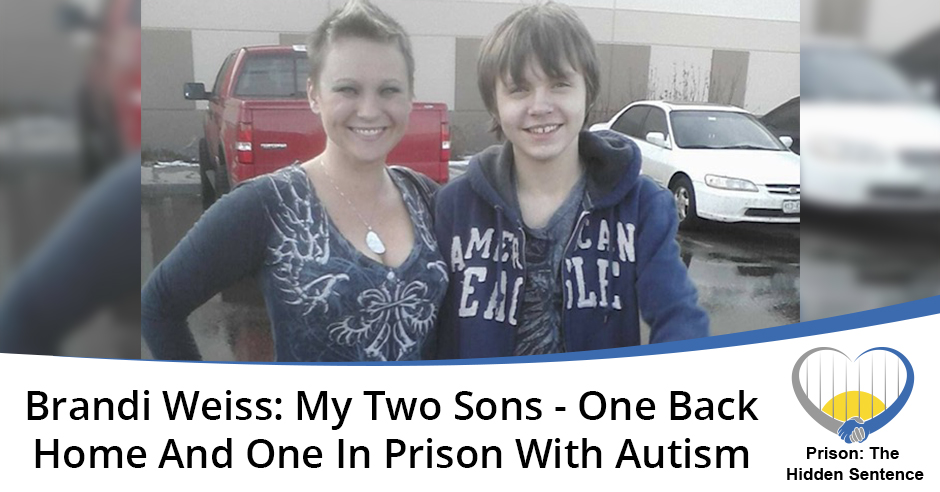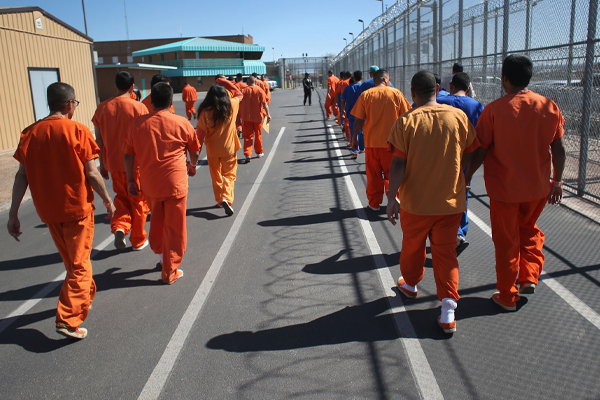
Brandi Weiss was thrown into the dark caverns of the prison system when her two sons were incarcerated. Her eldest son went through tumultuous times in his youth and was in and out of prison for 7 years. He now is out of prison and living a successful and happy life. Her youngest son was sentenced at 17 years old to 25 years in prison for a heinous crime. He is one of many of incarcerated people with autism. Enter the world of the prison system from a mother’s perspective of having one son thrive after prison and another who is sitting in prison with no support or compassion for his mental disability. Brandi could wallow in self-pity, but instead gives back by helping others who have loved ones in prison with mental disabilities.
—
Listen to the podcast here:
Brandi Weiss: My Two Sons – One Back Home And One In Prison With Autism
I’m here with Brandi from Knoxville, Tennessee. I met her in a workshop where I spoke about my brother’s incarceration. She reached out to me afterward to tell me about her son’s incarceration. We’ve been supporting each other ever since. Brandi, what did you think about the first time I started sharing about my brother?
I was excited. I didn’t get a chance to talk to people about having somebody that we care about, family members or even friends in prison. I don’t get that opportunity. I was excited that you were willing to talk about it openly with me.
That’s the Hidden Sentence. People don’t talk about it. When I did share in that workshop, I was hesitant because I didn’t know if people would judge me, but then, I’ve got to the point that I know once I opened my mouth and started talking about it, there’s somebody else out there that’s feeling the same, been through the same or is going through it, and somebody that I can share with. I am glad that I shared and we’re removing the hidden sentence. I’m glad that I was able to talk with you and we were able to support each other.
Your sons were incarcerated. One was incarcerated and one is currently incarcerated. That’s why we’re talking, so we can tell people the stories, they can learn from it, and come back with questions if they have questions. We like to share it because there are things that we go through that can help other people. If somebody else is going on this journey, there’s going to be a lot of information here about that. Let’s talk about your oldest son first. He was incarcerated in 2013. How did you find out about it?
One of his best friends called me while I was at work and said, “The police came and took Seth. I don’t know what to do.” That was how I found out.
After he called you, did you go to the police station?
I didn’t know what to do. My first thought was he needed to be bailed out of jail. The first thing I did was to get the money together to bail him out, which I didn’t even know how to find out how much I needed or anything. The bail bondsman was helpful in that. I called them and told them the information that I received. I didn’t know what to do and they got his name for me. They helped me through that a bit.
The more we hear about judgment and fearlessly speak about them, the more we are inspired to work towards a solution. Share on XYou went to the bail bondsman first to get his bail. They told you what it was set for. Are you able to take them home or did he have to go to court first for a hearing?
They held him for his court hearing and then I was able to bail him out. They had to set the bail amount.
How many days was he in before you got to see the judge?
It was two days.
Once you set the bail, you brought him home. Did you hire an attorney? What was the next step?
I brought him home. I was at a different place in life back then. He wasn’t letting me support him very much. Our relationship was a little tumultuous at that time. I ended up leaving Colorado where he was living even though I had bailed him out. I shouldn’t have left the state, but I had needed some help and I had to get out of the state. He dealt with it on his own for a while. After the charges came through, they picked him up and he had to do time.
Then he got out and I was out of Colorado at that time. He lived with friends. I was not involved in all of that until he came to live with me in Tennessee again, which was four years later in him being in and out of prison. When he came here to live with me, we finally got his case transferred to Tennessee. The last time he was released from prison, he had 24 hours to be here. He came to live with me and then we’d finished out his time here in Tennessee.
Let’s talk about that process. How difficult is it to get a transfer? A lot of times, we have families ask about that.
It should be easy. I had spoken to a lawyer out in Colorado because I thought maybe I needed a lawyer to get that transfer. She told me that we should be able to request it. She gave me that information, which I was grateful for. We talked to his parole officer, which what the lawyer had told me we needed to do. He kept saying that he was going to put in the paperwork and it never happened. It took about 2.5 years after the first time he asked to get transferred until it happened. The person who ended up helping him was a social worker within the prison while he was in. He told her that he had given up on life. He felt like he was in a losing situation. She knew that and he begged, “If I could get out to my mom. I know she’d helped me.” This lady put the paperwork through and got him out here.
When was he released from prison?
He was released from the Colorado Prison System in May of 2019.
That’s wonderful because you’ve told me he’s doing well but he is on parole. What is that? Was he living with you?

He got off of parole. He finally finished. That was a big milestone for him. When he got here, he had a day to get to the parole officer here, bring his paperwork, get registered and all the things. They had to come and check the house to make sure that everything in the living situation was legal to their standards. It was tough. They didn’t like him and didn’t trust him. He had to take a “put my head down and do this” attitude, but he did. We had one struggle where he violated his parole because he went to a certain location that they said was outside of where he should be, but he wasn’t aware of it. He did 30 days in jail for that but a lawyer looked up his case pro bono after hearing about that instance because he said that they’re picking on him. He fought that form and got it taken care of for free. There are good people out there.
After he came home, was he able to find work?
It was a little bit hard. He did about four interviews before he found a job that was willing to hire him. His first job was cooking at a restaurant and he loved it. He felt good about himself that he was making his own money and living life. They were good to him.
Is he still there?
No. It doesn’t pay much, but he’s doing factory work now. That’s been the thing that is easiest for him to get into and it pays well. Factory work is what he does.
Does he cook for you?
He has cooked for me. He’s a great cook.
You said you moved out so he’d spread his wings.
He got his own place with his best friend. They got a cute little house and they’re doing life. They’re happy.
That was your oldest son. He did about six years.
It was about seven.
Did you visit him when he was incarcerated?
No, not once. I was living in Tennessee and I did not have the means to visit him. He was doing little stints here and there where he’d violated, throw them in for a little bit, and then let them back out. He was homeless. He couldn’t hold down a job so he couldn’t pay his fees, and then they’d violate him again. There was no way to make plans to go find him somewhere. It was very unstable.
It was like a revolving door. That would be difficult, but now he’s back. You guys have gotten closer and he’s doing good. He has a job. He has his own place. If somebody has a loved one that’s coming home, it’s something that they could be aware of. Maybe not only be aware of it but also be prepared to do something.
I was conscious when he first got here that he was going to need some time to get his bearings. I didn’t force him into the conversation. If he wanted to be quiet, I didn’t try to make him talk. He was visibly uncomfortable a lot. He was aware of it. He would say something like, “I’m sorry, mom.” He didn’t even have to say anything. I knew he was just being able to breathe for a minute and I wanted him to enjoy that as long as he needed to. One thing that really sticks out is his stomach was sensitive. I wanted to cook him all these rich foods and spoil him with food, and his poor little tummy would not handle it well. Keeping the food bland for their poor tummies is probably a good idea.
Those are helpful insights. Thanks for sharing that. For those of you out there who have a loved one coming home, bland food for a while. Let’s talk about your youngest son who was incarcerated in 2014. This is a totally different situation. Tell us how you found out about his arrest.
My son had gone to live with his father in Florida while I was still living in Colorado. He was sixteen. We’d kept in touch. I had moved to Tennessee then. I got a phone call one day and it was my son. His father caught him breaking the law. His father left the house for a minute. My son picked up his phone and called me. He was like, “Mom, I’m scared. I’m in trouble.” I was like, “Tell me what’s going on.” He told me what he had done. His dad got back on the phone. I was begging him to call the police because I was afraid he was going to hurt my son pretty bad. I spoke to him on the phone before the police got there and took him away. That was the last time I’d ever talked to him as a free person. He was seventeen at that point.
His father called the police on him?
Yes.
That’s difficult.
The reason my second son is incarcerated is he molested his half-sister who was much younger. It was a scene that his father walked in on. I can’t imagine how it felt to be in his shoes that day.
One thing that we didn’t talk about was that your son does have autism. Unfortunately, there’s a lot of people in the prison system that do have a mental illness, autism or other situations. Speaking about it is important because we need to make sure that people, especially people in law enforcement, understand how to handle people that have different ways of thinking or seeing things or being in situations where we look at it and say, “That’s not right,” but somebody with a mental disposition might not know that or not realize it at the time that they are incarcerated. What was it like raising your son? I know there are different levels of autism.
I could tell early on that he was different. He did things differently. He reacted differently to things. I had him checked out by a variety of doctors. He was diagnosed with Asperger’s syndrome, which was also recognized at the time as high functioning autism. The spectrums are broader now. He was verbal a little bit later than most kids are. He was awkward. You could tell that he saw things very literally. Sarcasm was not something he got and he also was diagnosed with OCD. He very much liked things to be a certain way.
People with autism usually have difficulty distinguishing a dangerous situation even if it's already in front of them. Share on XIt was always something that I had to do. I have to protect him within the school system. Wherever he had to be, I had to be his advocate and protect him from harsher consequences than he deserved because his understanding of what he was doing was different from other people. When he got arrested, the first thing I wanted to do was find out who is going to be representing him and send them all the documentation that he’s autistic. He was on SSI as well.
It was federally determined that he had autism. I thought that was pretty solid. Little did I know that the court system that worked for him did not work for him. There was at no point when the judge would take into consideration his autism. It was a moot point. My son was arrested at seventeen. They charged him as an adult and gave him 25 years for an autistic person who was a minor and never committed any other crime. That blew my mind. It’s mind-boggling that they can do that. It doesn’t seem like anybody cares.
It’s difficult to imagine that the court doesn’t take into consideration that he is autistic. There are legislation and things that hopefully, will pass in the future, but that doesn’t help you now because we know that having loved ones with conditions and being incarcerated only makes it worse. He’s been in for several years now. Do you talk to him a lot? How do you guys communicate?

He calls me every night. For holidays, he’ll send me a little eCard so I get a little email through JPay with some little sparkly drawing that he gets to send. I’ve put commissary on for him and send him books. We were very close for being so far away from each other.
Is he in Tennessee?
He was incarcerated in Florida.
When things open up, do you think you’ll be able to go out and visit?
They opened up a modified visitation down there, which sounds like we get to see each other and be in the same room, but there has to be plexiglass or something in between our faces. We can have a hug at the beginning and a hug at the end of the visitation. I’ve got a couple of girls that I work with that already took some vacation time. I found out that I can go visit my son. This is new news. I haven’t seen him in two years. I’m excited to get to hug him and sit with him.
I wonder if you can take a picture.
They used to have a photographer thing that you could prepay for. Once I’ve scheduled the whole thing out, I’ll see if we can do that. I need a picture with my baby for sure.
I’m thinking of how visits are now with COVID and the way things are. I’ve heard other people talk about what visitation is like. Can you buy food? Can you touch? Sometimes you can. Sometimes you can’t. It’s different in every place and hopefully, we’ll have the new normal. Do you want to talk a little bit about what you know about being autistic in prison, what your son has gone through or shared with you?
Imagining being inside and the struggles that we know everybody faces on the inside whether it’s other people, gangs and lack of proper diet. Those are all real things. The thing about Chase having autism is he’s never been able to see a dangerous situation in front of him. The things that fire off in my head saying that, “This is unsafe. Don’t trust that person.” He didn’t have that. He’s probably developed some now. He was getting in dangerous situations a lot because he’s unaware of his effect on people. He’s been beaten up, raped, starved and thrown in the hole. He’s gone through it.
I don’t know that he wouldn’t have gone through it if he didn’t have autism, but I do have another son who does not, and he did not have the same kind of experience. It wasn’t good for my older son, but it seems that my younger son struggles harder with being hurt. Bullying was the theme of his entire life. From the time he started school, he was different. He was easy for other kids to make fun of. One of those things that always plays in my head is how unaware he is of something, a situation changing, and how important that must be to develop quickly if you’re thrown into the prison system.
One of our other show was with Jameela Lewis. She talked about PREA or the Prison Rape Elimination Act. There are things if a loved one is attacked sexually, whether it’s physical as rape. She talked about all the different things that are inappropriate. There is a group that is out there to help people that are incarcerated. There’s also the NAMI, the National Alliance on Mental Illness. They’re in prisons in some states and they’ve been helpful. It would be interesting to see if they have a footprint in Florida because that would be helpful for your son. Brandi, you said that your son was moved to a different pod?
His level changed and he was permitted to go to a safer pod, which is what it came down to. He had requested to go to a faith-based pod, and it’s changed his life in prison. He’s finally with people who they’re all doing self-help together, exploring religion and spirituality together. There’s no judgment on which direction each one of them takes for learning. Some are doing Buddhism. Some are doing Christianity. It’s neat and they support each other. On his birthday, I was talking to him and he kept saying, “Thank you.” I was like, “Chase, what’s going on?” He’s like, “Everybody keeps bringing me food.”
I was like, “Chase, it’s your birthday.” He’s like, “Yeah?” I was like, “They’re giving you gifts. It’s your birthday. They’re giving you something. That’s what they do.” It hadn’t occurred to him that that’s why everybody was giving him food. It warmed my heart because there are people being kind to him for the first time in his seven years of incarceration. It’s a neat thing that he talks about these people like they are his friends. It’s a silver lining because he hasn’t been in a good circumstance until now. It’s neat to hear about them and all the things that they talk about. They’re trying to improve who they are and how they perceive their circumstances and trying to find the positive in everything. It’s been neat talking to him.What I’ve been told several times is that you’re going to spend the time so why not do something with it? You can sit around and not do anything and complain or you can read, support each other, learn and become a better person while you’re incarcerated. I love that story about him not realizing it’s his birthday present. He does have such a sweetness to him.He does. Thank you.
You’ve been through a lot with both of your sons. You got your one son home and everything is doing good. For the next however, it’s many years. You’ve got your other son that is in Florida that you’ll be spending your time visiting. It changes people’s lives and realized that when you have somebody that’s incarcerated, your life changes because you want to see your loved one whether you’re writing to them, you’re talking to them on the phone, you’re spending time traveling, whether if he goes once a month or once every couple of months. That’s the time that you were spending that’s changing your life. It’s something that you wouldn’t normally be doing. A lot of people take the situation and take what they’ve learned to help others. Brandi, you’ve started a meeting in the Prison Family Support Group for loved ones with disabilities. I know it started about autism, but they expanded it. It’s wonderful that all the people you’re helping are going through this. Could you talk a little bit about the group, how you started it with autism, and how you expanded it?

At a certain point, you get super tired of feeling powerless over what’s happening and how you can’t fix anything for these people you love. You’re like, “What the heck can I do?” I had the energy to put into this. It was restless. After talking to you, hearing what you do, and how many people you’ve helped, I thought, “I wonder if there’s any way I can support. What can I do?” We started talking about this support group. It is something that I was like, “That’s what I’m going to do. That makes sense.”
I am more focused on my son with autism because it’s unique. I feel like some of the challenges and fears are the unique part of the complete misery that the whole situation is. After talking some more about it, I realized that there’s a need for people to be able to talk about it, even if it’s bipolar, schizophrenia or organic brain dysfunction. The thing is that he’s in prison and anything that relates to his autism, there’s no record that he has it. He’s not treated any differently than anybody else, which makes sense if they don’t admit that he has autism in the trial.
That’s got to be as frustrating for a mom, father or family member who’s dealt with somebody that had bipolar or something else. It made sense to broaden that out for other family members or friends that have that same concern. I’ve noticed with what you’re doing is the more people that come together about these kinds of issues, there’s a change that starts happening. What I want to do is get in front of some change and let it mow me over like, “Let’s get to it.” The conversation is how it all starts anyway. I appreciate having these conversations
I appreciate being asked these questions. I want people to feel like they can talk about this. This is a hidden sentence. The first thing I went through was shame and embarrassment. I felt very judged. There were a lot of things that you feel immediately that keeps you from wanting to talk about it. The more we hear about these things and fearlessly speak about them, how it makes us feel and the struggles behind it, once we can get through that, let’s get into a solution together. What do we all know? What have you been through that can help me and help each other navigate through this difficult circumstance?
It's alarming for the prison system to not treat people with mental disabilities differently and see them just like everybody else. Share on XYou speak for a lot of people because when somebody is arrested and taken into the prison system, we all have those feelings. I don’t think I’ve spoken to anybody who has felt any differently than those words that you said like shame and judgment. We want to remove the stigma by having these show, meetings and talking into groups. Getting out there, talking about it, and speaking to our legislators because a lot of them aren’t aware of this.
When you look at the number of people who have an illness that’s incarcerated, they are still people. They committed a crime but that’s not who they are. We still want to treat them humanely. If you take somebody that has autism, schizophrenia or bipolar, and then you put them in lockdown or solitary, they have nobody to talk to and they’re in this room, they’re going to react and act out because it’s not healthy for them. We need to look at that. It goes into our vets with PTSD and on and on for incarcerated people. However, we need to be able to help them in a way so that when they return to society, they’re no more broken.
We’re supporting people on the outside. Hopefully, by educating people, people who are coming to the support meetings and listening to the podcast are more aware. I spoke to a student and she came to a meeting and listened to people talking about incarceration. As a student, she came to see a fun group to sit on. She goes, “I never realized how it affects the family.” I was like, “This is what we’re doing. We’re raising awareness. We planted a seed.” Thank you for what you’re doing. I hope that anybody who’s affected that has a loved one that’s incarcerated with disabilities or mental illness, come to Brandi’s meeting. It’s the second Friday of the month through Prison Family Support. That’s on The FFIP website, The Friends and Family of Incarcerated Persons. Brandi, thank you so much for sharing.
Thank you, Julia.
I’m proud of what you are doing. We’ll talk soon.
Important Links:
- Jameela Lewis – previous episodePREANAMIPrison: The Hidden SentenceThe FFIPhttps://www.AutismSpeaks.org/
About Brandi Weiss
 Brandi Weiss is a mother of three. She’s a career Cosmetologist and became a full-time humanitarian while going through challenges with her own children and listening to the life struggles of her clients.
Brandi Weiss is a mother of three. She’s a career Cosmetologist and became a full-time humanitarian while going through challenges with her own children and listening to the life struggles of her clients.
One ting she is sure of :we need to support each other and advocate for each other.
Being in an environment where she gets to listen to others struggles every day has put her in a unique opportunity to connect people that can help each other.
Her goal is to expand her unique talents to connect and help people world-wide.

Jean E Willis says
I am so proud of my daughter, Brandi. She is a wise woman. A loving mother to all 3 of her children, ( my grandkids) She stands for what she believes in. Chayse has been through more is his young life. Sending love to them all.